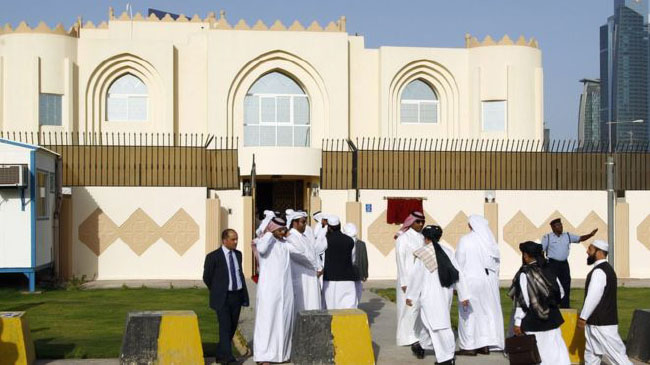It is confirmed that Taliban’s political representatives and United States officials have held direct talks in Qatar with no third party. The Taliban political representative, Mutasim Agha Jan, said the talks with American officials in Qatar was ‘very useful’, adding that both sides explored ways for holding formal and high-level dialogues. It is said that US Principal Deputy Assistant Secretary of State for South and Central Asian Affairs led the delegation of initial talks in their first contact to end the conflict in Afghanistan. “though the negotiations are at the initial stage, both sides discussed options to pave the way for future contacts and the talks were held in a ‘very cordial atmosphere and both sides had useful exchanges”, he added.
Mutasim Agha Jan expressed optimism saying,“I’m confident that Taliban and US will continue dialogue and will reach a deal.” In regards to a question regarding the absence of the Afghan officials in the talks, Aga Jan said Taliban’s war was not against Afghans, but the Americans and their invasion of the country, emphasizing that the Afghan government should not have any objections as a peace deal would end the long lasting conflict in the country.He said Taliban’s demands for peace include an end to the invasion and the removal of the names of Taliban leaders from the United Nations sanctions list.
In addition, the Taliban negotiators have called for the opening of their office to be the main channel of talks with the US. Their office was closed down days after it was opened in 2013 after then Afghan President Hamid Karzai criticized the Taliban white flag and plaque of the “Islamic Emirate” displayed at the office. Taliban used the white flag and Islamic Emirate during their rule of Afghanistan (1996-2001). Despite the office’s closure, the Taliban political envoys continued to reside in the oil-rich Gulf state for contacts with the world community. Once, in January they had visited Pakistan to discuss prospects for reconciliation. After the visit, the Taliban told Pakistani authorities that they would not hold talks with the Kabul administration but were ready for talks with the US.
When a US ministry official was asked about the talks, he said: “The United States is looking for all ways to advance the peace process (in Afghanistan) in consultation with the Afghan government. “The Taliban have always rejected negotiations with the Afghan government and are calling for direct talks with the United States. But a senior US State Department official said that any talks on the Afghan political future will be conducted between the Afghan government and the Taliban.
What has become a hallmark of the Trump administration’s approach now, U.S. officials seem to begin negotiations without any preconditions. While Trump announced his new war strategy last year, stated that Taliban and Islamic State insurgents in Afghanistan “need to know they have nowhere to hide, that no place is beyond the reach of American might and American arms.” After they declared end of combat operations in 2014, most American troops withdrew to major population areas in the country, leaving Afghan forces to defend remote outposts. Many of those bases fell in the following months. During a news conference last month in Brussels, Gen. John W. Nicholson Jr., the commander of the American-led coalition in Afghanistan, said remote outposts were being overrun by the Taliban, which was seizing local forces’ vehicles and equipment.
Currently, out of 407 Afghanistan’s districts the government either controls or heavily influences 229 to the Taliban’s 59. The remaining 119 districts are considered contested, according to the Office of the Special Inspector General for Afghanistan Reconstruction. Hamdullah Mohib, the Afghan ambassador to the United States, recently disputed that American and Afghan forces were leaving rural areas and essentially surrendering them to the Taliban. The intent was not to withdraw, quoted from Mr. Mohib, but to first secure the urban areas to allow security forces to later focus on rural areas.
By and large, the United States has made several efforts to negotiate with the Taliban but the current diplomatic effort is the first serious bilateral attempt at talks between the United States and the Taliban since 2013. In 2015, the United States, China, Pakistan, and Afghanistan attempted to sustain talks with the Taliban through a process known as the Quadrilateral Coordination Group. That summer, it emerged that Mullah Omar, the founding leader of the Taliban had died two years prior, prompting a leadership succession crisis in the Taliban that led to the group’s fracturing within the period.
The talks between Taliban and US occur after the Special Representative of the Russian President, Dmitry Kebov, recently announced that the Russian government had called for Taliban representatives to visit Moscow before the end of the summer. Kubulov justifies Moscow’s decision to negotiate with the Taliban, arguing that the Taliban “control more than half of the territory of Afghanistan,” and therefore must be included in the final peace deal in Afghanistan.
Given the United States’ engagement in Afghanistan, Russia might have limited chance to influence the countries’ issues, but the controversial nature of Russian involvement in Afghanistan is very important for Moscow, as they have been accused of equipping the Taliban.Furthermore, Russia may use the Moscow peace talks to increase the credibility of the Shanghai Cooperation Organization’s efforts to facilitate political settlement in Afghanistan. Chinese President Xi Jinping at his sixteenth Cingdao summit in June showed his strategy to strengthen the role of the Contact Group of the Shanghai Cooperation Organization, a peaceful solution to the conflict in Afghanistan.
Home » Opinion » US and Taliban Initial Talks Starts in Qatar
US and Taliban Initial Talks Starts in Qatar
| Mohammad Zahir Akbari

